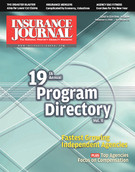Legislate Commissions
“After hearing from various interested parties, if HHS does not fix this language before the rule is final, we hope that Congress will step in and revise the MLR formula through the legislative process.”
—Charles E. Symington Jr., senior vice president for government affairs for the Independent Insurance Agents & Brokers, after the Obama Administration announced that broker commissions would not be protected in the medical loss ratio that health insurers must adhere to beginning in 2011. The MLR requirement is part of the Patient Protection and Affordable Care Act and requires health insurers to spend 80 to 85 percent of consumers’ premiums on direct care for patients. The intention is to limit the share of premiums that insurers spend on administrative costs and profits, including executive salaries, overhead and marketing.
BP at the Beach
“I think we’ll get 99 percent of what’s out there. There may be some little BB-sized tar balls that get left, but over time nature will take care of that on its own and it will just sort of dissolve back into the surface.”
—BP spokesman Ray Melick on BP’s efforts to clean up beaches damaged by the oil disaster. Some environmentalists fear the heavy machinery BP is using will kill creatures that live or cause erosion problems. The company also is pumping salt water onto the beach in some areas in an attempt to rinse away the oil residue and speed up the bleaching process. BP said the major work should be done by mid-February.
A Mistaken Assumption
“Consumers might mistakenly assume that these beverages are safe because they are widely sold.”
—David Vladeck, director of the Federal Trade Commission’s Bureau of Consumer Protection. U.S. regulators warned makers of caffeinated alcoholic drinks that their products are unsafe and violate federal laws, following a public outcry and several state bans. The U.S. Food and Drug Administration sent warning letters to four firms – Phusion Projects LLC, United Brands Co., New Century Brewing Co. and Charge Beverages – charging that seven of their drinks combining alcohol and caffeine were unsafe. The FTC also warned the manufacturers that their marketing may be deceptive or unfair. Sweetened drinks with high levels of alcohol and caffeine grabbed headlines across the country after hospitalizations were required in several incidents after the drinks were consumed. In many cases, the drinkers were underage. The drinks have already been banned in several states including Washington and Michigan.
Was this article valuable?
Here are more articles you may enjoy.


 What Analysts Are Saying About the 2026 P/C Insurance Market
What Analysts Are Saying About the 2026 P/C Insurance Market  Florida’s Commercial Clearinghouse Bill Stirring Up Concerns for Brokers, Regulators
Florida’s Commercial Clearinghouse Bill Stirring Up Concerns for Brokers, Regulators  Nine-Month 2025 Results Show P/C Underwriting Gain Skyrocketed
Nine-Month 2025 Results Show P/C Underwriting Gain Skyrocketed  Insurify Starts App With ChatGPT to Allow Consumers to Shop for Insurance
Insurify Starts App With ChatGPT to Allow Consumers to Shop for Insurance 


